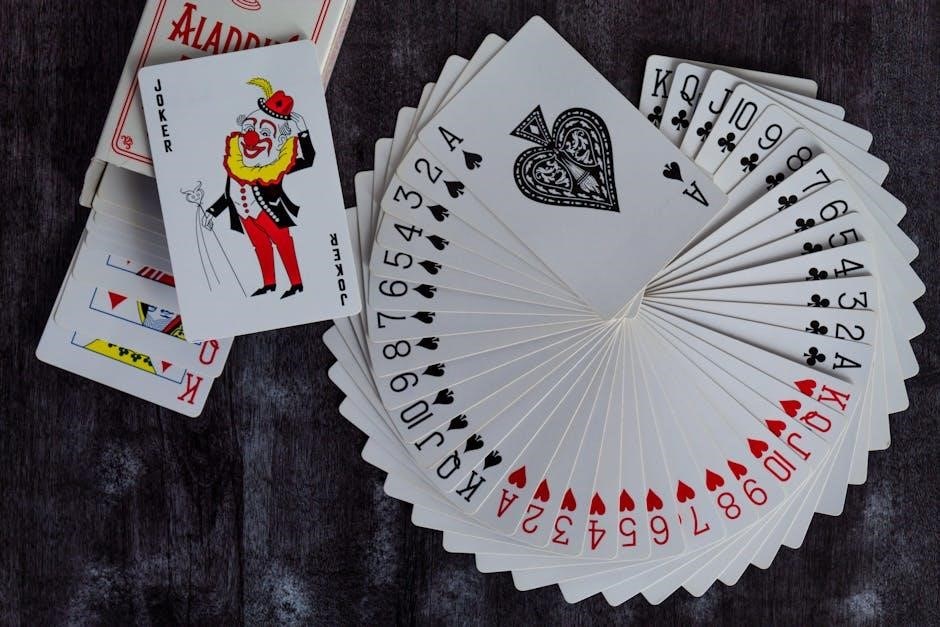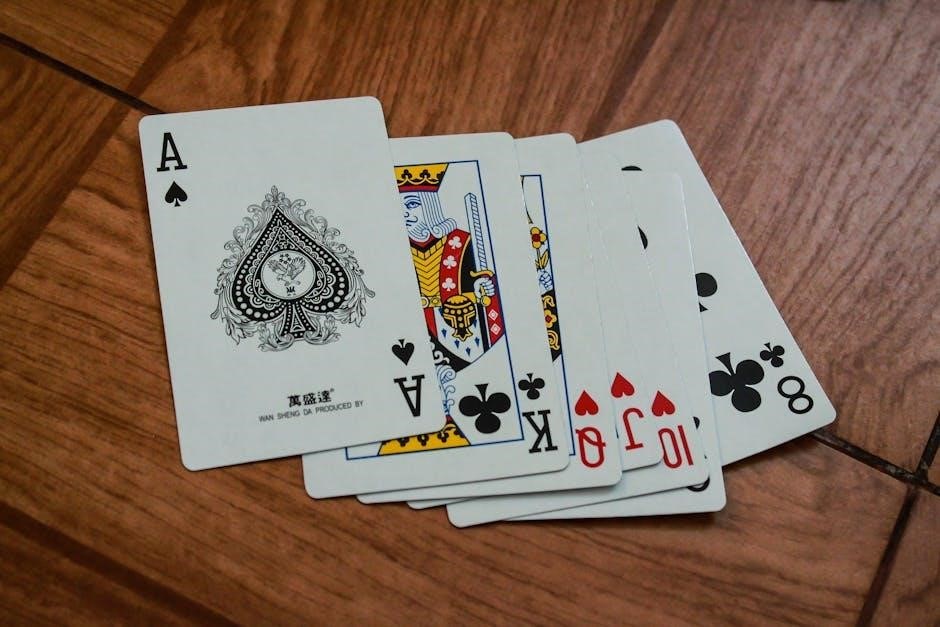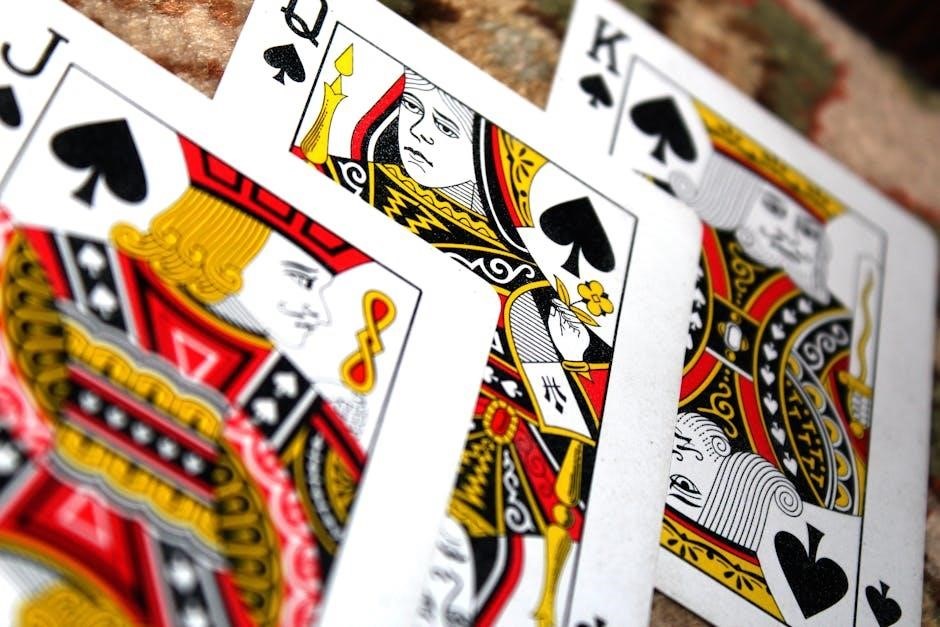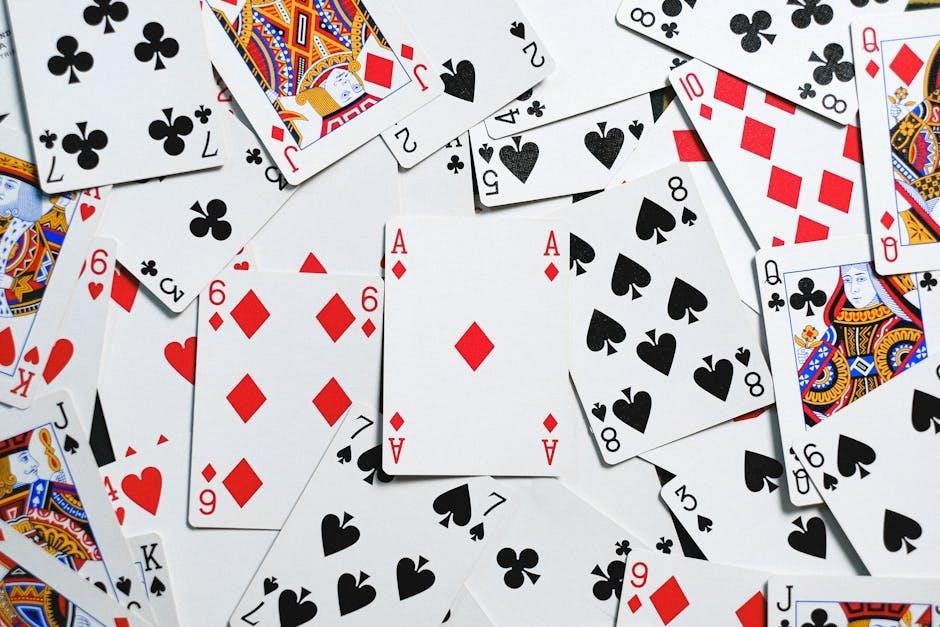Discover how a simple deck of cards can transform math learning into engaging‚ interactive experiences. These games offer versatile‚ easy-to-setup activities that enhance numerical understanding and problem-solving skills for all ages.
Overview of Card-Based Math Activities

Card-based math activities offer a wide range of engaging and interactive learning experiences. From simple games like Go Fish! for addition and subtraction to more complex games like Cribbage‚ these activities cater to various skill levels. Players can practice mental math‚ number comparison‚ and combinations while developing problem-solving strategies. Games like Pyramid and Multiplication Quick Draw focus on specific math concepts‚ while Memory (Concentration) enhances matching and addition skills; These activities are highly customizable‚ allowing educators and parents to adapt them to different age groups and learning objectives. By using a standard deck of cards‚ these games provide a fun‚ hands-on approach to math education‚ making learning accessible and enjoyable for all participants.
Why Use Playing Cards for Math Education?
Playing cards are an excellent tool for math education due to their versatility and accessibility. They provide a hands-on approach‚ making abstract concepts tangible and engaging for learners of all ages. Cards can be easily manipulated to demonstrate various math operations‚ such as addition‚ subtraction‚ multiplication‚ and division. Their portability and affordability make them ideal for both classroom and home use. Additionally‚ playing cards allow for the development of mental math skills and strategic thinking‚ which are essential for problem-solving. By incorporating playing cards into math activities‚ educators can create dynamic and interactive learning experiences that foster numerical fluency and a deeper understanding of mathematical principles.
Benefits of Card Games in Learning Math
Card games offer numerous benefits for math education‚ enhancing engagement and understanding. They provide interactive‚ hands-on experiences that make learning enjoyable and accessible. Players develop mental math skills through quick calculations and strategic thinking. Card games also improve numerical fluency‚ as they require recognizing and manipulating numbers. They cater to different learning styles‚ allowing visual and kinesthetic learners to thrive. Additionally‚ these games foster healthy competition and collaboration‚ reducing math anxiety. The repetitive nature of card games reinforces math facts‚ making complex concepts feel manageable. Overall‚ card-based activities create a dynamic environment where students can practice and master mathematical skills in a fun and motivating way.

Basic Math Games Using a Deck of Cards
Explore fun and interactive math games using a standard deck of cards. These activities introduce foundational concepts like addition‚ subtraction‚ and number comparison in an engaging way.
Pyramid: A Math Card Game to Make Ten
Pyramid is a fun and interactive card game designed to help players practice making ten. To set up‚ remove all face cards and organize the remaining cards face up in a pyramid structure‚ with four cards on the bottom row‚ three on the next‚ and so on‚ until the top row has one card. Players take turns drawing cards and trying to combine them to make sums of ten. The goal is to collect the most pairs of cards that add up to ten. This game is ideal for developing addition skills and understanding number relationships. It’s simple‚ engaging‚ and perfect for all ages!
Go Fish! for Addition and Subtraction Facts
Adapt the classic Go Fish! game to practice addition and subtraction facts. Players use a standard deck of cards‚ with face cards assigned numerical values (e.g.‚ Jack = 11‚ Queen = 12‚ King = 13). To play‚ deal 5-7 cards to each player. On their turn‚ a player asks another for a specific number needed to complete an addition or subtraction problem. If the request is granted‚ the player solves the problem aloud and keeps the card. The goal is to collect the most pairs by solving math facts correctly. This game enhances mental math skills‚ strategic thinking‚ and numerical fluency while fostering fun competition.
Multiplication Quick Draw
Multiplication Quick Draw is a fast-paced game designed to sharpen multiplication fluency. Players use a standard deck of cards‚ removing face cards. Deal two cards to each player and place the remaining deck face down. On their turn‚ a player multiplies the two cards they receive‚ announcing the product aloud. The first player to correctly state the product keeps both cards. The goal is to collect the most cards by solving multiplication problems swiftly and accurately. This game enhances mental math skills‚ promotes quick thinking‚ and makes practicing multiplication facts engaging and competitive. It’s ideal for reinforcing multiplication tables in a fun‚ interactive way.
War: A Simple Card Game for Number Comparison
War is a straightforward yet effective card game that focuses on number comparison skills. To play‚ shuffle a standard deck of 52 cards and deal equal halves to two players. Each player reveals their top card simultaneously‚ and the card with the higher numerical value wins the round. The winner collects both cards‚ and the process repeats until one player has all the cards. Face cards can be assigned numerical values (e.g.‚ Jack = 11‚ Queen = 12‚ King = 13‚ Ace = 14). This game is ideal for teaching children to compare numbers and understand their relative values. Its simplicity makes it accessible to younger learners while fostering healthy competition and quick decision-making skills.

Advanced Math Games with Playing Cards
Explore sophisticated card games like Blackjack‚ Cribbage‚ and Memory‚ designed to enhance mental math‚ strategy‚ and problem-solving skills. These activities challenge players to apply advanced numerical concepts creatively;
Blackjack: Applying Mental Math and Strategy
Blackjack is a classic card game that combines mental math with strategic thinking. Players aim to reach a total of 21 without exceeding it‚ using numbered and face cards. Each card’s value is crucial‚ with face cards typically assigned a value of 10. This game enhances mental math skills as players quickly add card values and calculate risks. It also fosters strategic decision-making‚ such as choosing to “hit” or “stand.” The game is easy to set up and requires a standard deck of 52 cards. By focusing on numerical calculations and probability‚ Blackjack provides an engaging way to practice math while developing critical thinking. It’s adaptable for various skill levels‚ making it a versatile learning tool.
Cribbage: A Game for Understanding Combinations

Cribbage is a card game that emphasizes understanding combinations and numerical patterns. Players score points by forming pairs‚ runs‚ and combinations of cards that add up to 15. The game requires a deep understanding of how different card values can be combined to achieve specific totals. Face cards are typically assigned a value of 10‚ while numbered cards retain their face value. This game enhances mathematical reasoning by encouraging players to think creatively about combinations and permutations. It also sharpens mental math skills as players calculate scores and strategize. Cribbage is an excellent way to engage students in math-related problem-solving while providing a fun and competitive experience. The game’s structure makes it ideal for practicing numerical fluency and pattern recognition.
Memory (Concentration): Matching and Addition
Memory‚ or Concentration‚ is a card game that enhances memory and addition skills. Players lay out a deck of cards face down and take turns flipping two cards to reveal their values. If the cards match in value‚ the player keeps them and adds the numbers together. The goal is to collect the most pairs and accumulate the highest total. Face cards can be assigned numerical values‚ with jacks as 11‚ queens as 12‚ and kings as 13. This game improves memory recall‚ numerical fluency‚ and addition skills. It also fosters healthy competition and strategic thinking. Memory is an engaging way to practice math facts while having fun. The simplicity of the game makes it accessible to all skill levels.
Box Cars: A Math Game for Commutative Addition
Box Cars is a dynamic math game designed to teach commutative addition‚ demonstrating that the order of numbers does not change their sum. Players use a standard deck of cards‚ assigning numerical values to face cards—jacks as 11‚ queens as 12‚ and kings as 13. The game begins by dealing an equal number of cards to each player. Each player reveals two cards‚ adds their values‚ and writes the addition sentence. The player with the highest sum collects all revealed cards. This game not only reinforces addition facts but also introduces the concept of commutative property‚ making it an engaging way to practice math skills. Box Cars encourages strategic thinking and healthy competition while fostering a deep understanding of numerical relationships.

Educational Benefits of Card Games
Card games enhance numerical fluency‚ boost mental math skills‚ and improve problem-solving abilities. They also increase engagement‚ making math learning enjoyable and interactive for students of all ages.
Numerical Understanding and Fluency
Card games enhance numerical understanding by engaging players in hands-on math activities. Games like Pyramid and Go Fish! require quick mental calculations‚ improving addition‚ subtraction‚ and multiplication fluency. Players develop number sense by recognizing patterns and relationships between cards. For instance‚ assigning numerical values to face cards (e.g.‚ Jack as 11‚ Queen as 12) expands the range of math problems. These activities make abstract concepts tangible‚ fostering a deeper grasp of numerical operations. Regular practice through card games builds confidence and speed in solving math problems‚ making them an effective tool for learners of all ages. They also encourage critical thinking and adaptability in mathematical reasoning.
Development of Mental Math Skills
Card games excel at fostering mental math skills through quick calculations and strategic thinking. Games like Quick Draw and War require players to rapidly add‚ subtract‚ or compare numbers‚ enhancing their ability to compute without external aids. The use of face cards‚ assigned numerical values (e.g.‚ Jack as 11‚ Queen as 12)‚ expands the range of math problems. Players develop fluency in arithmetic operations and improve their speed in solving problems. These activities also encourage strategic planning and adaptability‚ which are essential for advanced mental math. By repeatedly engaging in such exercises‚ learners build confidence and proficiency in handling mathematical challenges‚ making card games a powerful tool for mental math development.
Enhancing Problem-Solving Strategies

Card games provide an engaging platform for developing problem-solving strategies‚ encouraging players to think critically and adapt to changing scenarios. Games like Blackjack and Cribbage require strategic decision-making‚ such as calculating probabilities or forming combinations‚ which sharpens analytical thinking. Players must evaluate their cards‚ anticipate outcomes‚ and adjust their approaches accordingly. These activities foster logical reasoning and the ability to make informed choices under uncertainty. By repeatedly engaging in such strategic games‚ learners develop resilience and adaptability‚ essential for tackling complex math problems. Card games also promote creativity in finding solutions‚ helping players refine their problem-solving techniques and apply them to real-world challenges.
Improving Engagement in Math Learning
Math games with a deck of cards are a powerful tool for boosting engagement in learning. By transforming math into an interactive activity‚ these games make concepts more accessible and enjoyable. Players are motivated by the excitement of competition and the satisfaction of mastering new skills. Card games also encourage active participation‚ as learners manipulate cards‚ calculate results‚ and strategize. This hands-on approach fosters a deeper connection to math‚ making it feel less like a chore and more like a fun challenge. Additionally‚ the variety of games available ensures that students remain interested and eager to explore different math concepts. Engagement is further enhanced by the social interaction that comes with playing games‚ creating a collaborative learning environment. This dynamic approach helps students stay focused and excited about math‚ fostering a positive attitude toward learning.

Setting Up Math Card Games
A standard deck of 52 cards is ideal for most math games. Remove jokers and deal cards evenly among players. Assign numerical values to face cards as needed.
General Setup for Card-Based Math Activities
Preparing for card-based math activities is straightforward. Begin by using a standard 52-card deck‚ removing jokers unless specified. Shuffle the deck thoroughly to ensure randomness. Depending on the game‚ deal cards equally among players or place them face down in a pile. For activities involving face cards‚ assign numerical values: Jacks as 11‚ Queens as 12‚ and Kings as 13. Aces can represent 1 or any chosen value. Ensure all participants understand the rules and objectives before starting. This setup applies to most math games‚ making it versatile for various age groups and skill levels. Clear instructions and organized dealing are key to smooth gameplay.
Customizing Games for Different Skill Levels
Adapting card-based math games to suit various skill levels ensures inclusivity and engagement. For younger learners‚ simplify by focusing on basic operations like addition or subtraction. Use face cards as 11‚ 12‚ or 13 to introduce larger numbers gradually. For advanced players‚ incorporate multiplication‚ division‚ or mental math challenges. Modify rules to align with learning objectives‚ such as limiting card values or focusing on specific math concepts. Varying the complexity of tasks allows the same game to be enjoyed by different age groups. This flexibility makes card-based activities versatile tools for tailored math practice‚ ensuring each participant is appropriately challenged and engaged.
Assigning Numerical Values to Face Cards
Face cards in a deck can be assigned specific numerical values to enhance math games. Typically‚ Jacks are valued at 11‚ Queens at 12‚ and Kings at 13. This standardization allows for consistent gameplay and simplifies calculations. By assigning these values‚ face cards become integral to operations like addition‚ subtraction‚ and multiplication. For younger players‚ face cards can also be treated as 10 to ease complexity. Alternatively‚ educators can customize values based on learning objectives‚ such as setting all face cards to 10 for simpler arithmetic or varying them to introduce higher numbers. This flexibility ensures face cards are useful across different skill levels and activities‚ making math games versatile and engaging.

Classroom and Home Management Tips
Organize card-based math activities by setting clear objectives‚ managing time effectively‚ and encouraging healthy competition. Ensure smooth gameplay by explaining rules and preparing materials in advance for all participants.
Selecting the Right Game for Learning Objectives
Selecting the appropriate card game for math learning involves aligning the game’s objectives with the desired mathematical skills. For instance‚ games like Go Fish! can be tailored to focus on addition or subtraction facts‚ while Pyramid is ideal for practicing making ten. Multiplication Quick Draw is effective for reinforcing multiplication tables‚ and War helps with number comparison skills. Each game has specific benefits‚ so matching the activity to the learning goal ensures targeted skill development. By choosing games that align with curriculum needs‚ educators and parents can maximize the educational value of card-based math activities.
Managing Time and Player Engagement
Effective time management and player engagement are crucial for maximizing the educational benefits of math card games. Set a timer to ensure games remain focused and within allocated time frames. Rotate between fast-paced games like Multiplication Quick Draw and strategic ones like Blackjack to maintain interest. Encourage active participation by pairing players of varying skill levels‚ promoting peer learning; Use visual reminders or signals to transition smoothly between activities. Incorporate breaks to discuss strategies or review math concepts‚ reinforcing learning while keeping players motivated. By balancing structure and flexibility‚ educators and parents can foster an engaging and productive math learning environment.
Encouraging Healthy Competition
Healthy competition enhances engagement and motivation in math card games. Introduce scoring systems where players earn points for correct answers or winning rounds‚ fostering a sense of achievement. Use fast-paced games like Multiplication Quick Draw or War to create exciting rivalries. Encourage players to track their progress over time‚ celebrating improvements. Recognize top scorers without overemphasizing winning‚ ensuring all participants feel valued. Pairing players of similar skill levels can promote fair competition. Offer small rewards or badges for milestones‚ keeping the focus on fun and learning. Balancing competition with collaboration ensures a positive environment where math skills and sportsmanship thrive.

Math Games with a Deck of Cards in PDF Format
Math games in PDF format offer convenient access to card-based activities. Download‚ print‚ and customize decks for various math skills. Use QR codes for easy instruction access.
Downloading and Printing Math Card Games
Downloading and printing math card games is a convenient way to access a variety of activities. Many websites offer free PDF resources that include game instructions‚ card templates‚ and customizable options. Simply download the PDF‚ print the cards on sturdy paper or cardstock‚ and cut them out. This method allows for easy setup and reuse. Some resources even include QR codes linking to video tutorials or digital versions of the games. Printing at home ensures you have a ready-to-use deck for teaching or practice. These printable games are ideal for classrooms‚ homeschooling‚ or family fun‚ making math learning accessible and enjoyable for everyone.
Creating Custom PDF Resources for Card Games
Creating custom PDF resources for card games allows educators and parents to tailor activities to specific learning needs. By designing personalized card decks‚ you can focus on particular math concepts‚ such as addition‚ subtraction‚ or multiplication. Tools like Canva or Microsoft Word can be used to create visually appealing layouts. Include game instructions‚ card templates‚ and examples to ensure clarity. Custom PDFs can also incorporate QR codes for easy access to additional materials or video guides. This flexibility ensures that math games remain engaging and relevant for various skill levels and learning objectives‚ making them adaptable to different teaching environments and student preferences.
Using QR Codes for Accessing Game Instructions
QR codes provide a seamless way to integrate digital resources with physical card games‚ enhancing accessibility. By embedding QR codes on PDF game sheets‚ users can instantly access instructional videos‚ rule guides‚ or interactive demos. This feature is particularly useful for visual learners‚ as it offers a multimedia approach to understanding game mechanics. QR codes can also link to printable card templates or scoring systems‚ making setup effortless. Educators can create custom codes for each game‚ ensuring that students and players have all necessary information at their fingertips. This modern tool bridges the gap between traditional card games and digital learning‚ fostering engagement and convenience.
Troubleshooting and Variations
Address common challenges by adjusting rules or introducing variations. Modify games to suit different skill levels or age groups. Keep play engaging by adding new twists periodically.
Adapting Games for Different Age Groups
Adapt math card games to suit various age groups by adjusting complexity and rules. For younger children‚ simplify tasks like basic addition or subtraction using numbered cards. Older students can tackle advanced concepts like multiplication or mental math. Modify face card values‚ such as assigning Jack=11‚ Queen=12‚ and King=0‚ to suit skill levels. Introduce strategy elements for teens‚ like probability or algebraic thinking. Use visual aids or guided play for beginners‚ while encouraging independent problem-solving for older players. These adjustments ensure games remain engaging and educational for diverse age ranges‚ fostering math fluency and critical thinking skills effectively.
Handling Common Challenges in Card Games
Common challenges in card games include rule misunderstandings‚ disputes over answers‚ and player frustration. To address these‚ ensure clear rule explanations and demonstrations. Encourage players to think aloud and discuss their reasoning to foster understanding. For disputes‚ use face-up cards or written calculations to verify answers. To prevent frustration‚ allow time for problem-solving and celebrate effort‚ not just correctness. For younger players‚ provide visual aids or examples. For advanced players‚ introduce strategy tips. Regularly remind players of the rules and objectives to maintain focus. These strategies help create a positive‚ productive environment for math learning through card games.
Introducing Variations for Repeated Play
To keep card games fresh and engaging‚ introduce variations that challenge players in new ways. For example‚ in Go Fish!‚ instead of collecting sets‚ players can solve math problems to earn cards. In Multiplication Quick Draw‚ add a timer or require players to multiply by multiple numbers. For War‚ incorporate mental math by having players add or multiply their cards before comparing. Memory can be adapted by matching both numbers and their word forms. These variations keep the games exciting and reinforce different math skills‚ ensuring continued learning and fun with each play; They also cater to different skill levels‚ making the games adaptable for various learners.
Leave a Reply
You must be logged in to post a comment.